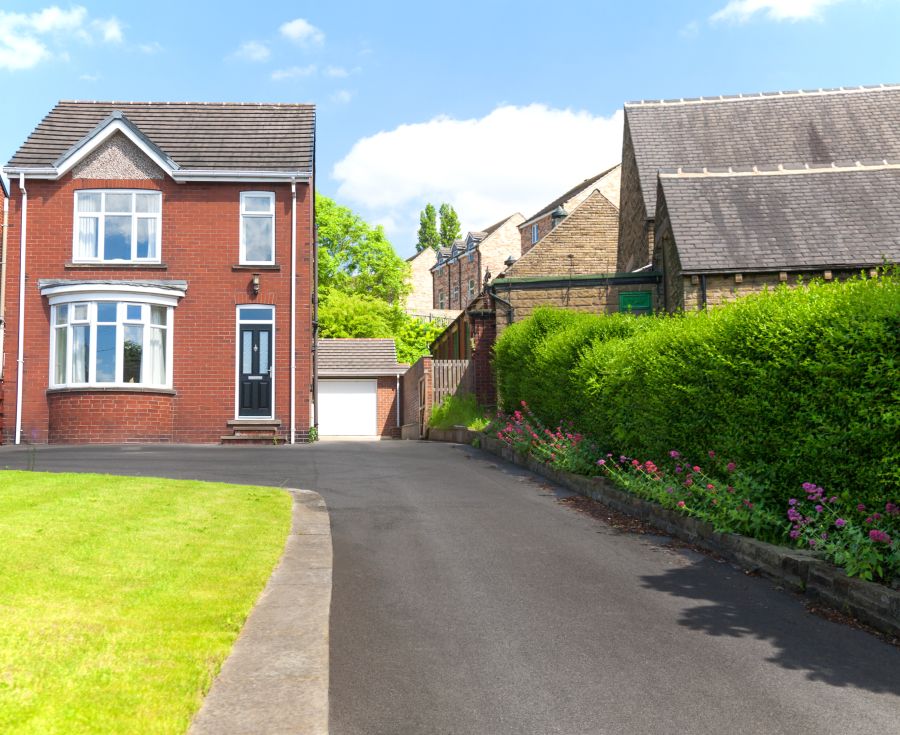In an era of increasing environmental awareness, with climate change being debated on a daily basis, homeowners are seeking ways to make their properties more sustainable. Cavity wall insulation, heat pumps, solar panels, you name it, they’re all hot topics.
Yet one area which is often overlooked is the driveway. Traditional driveways, typically made from asphalt or concrete, can have a significant environmental impact.
Thankfully, there are eco-friendly alternatives that are both stylish and sustainable.

Why Choose an Eco-Friendly Driveway?
There are three main reasons a homeowner would choose an eco-friendly driveway over a traditional one. The first of these is;
- Reduced Environmental Impact:
Rainfall in the UK is becoming more and more unpredictable, with heavier rainfalls seemingly more and more common. Yet traditional driveway surfaces like concrete and asphalt are impermeable, preventing rainwater from naturally filtering into the ground.
This phenomenon is called reduced runoff, which leads to more surface water, soil erosion and potential pollution of local waterways.
Eco-friendly options like gravel and paving allow rainwater to naturally infiltrate the ground, reducing runoff and replenishing groundwater naturally.
Reducing your carbon footprint is another goal of many individuals and homeowners. The production of both asphalt and concrete requires significant energy and in turn releases large quantities of greenhouse gases.
Yet in contrast, eco-friendly alternatives like gravel and resin often have a much lower lower carbon footprint.
Lastly, constructing an eco-friendly driveway will ensure you reduce the ‘heat island effect’.
Traditional driveways absorb and retain heat, contributing to the urban heat island effect. Alternative options such as permeable paving, help to reduce heat absorption and improve air quality.
- Improved Aesthetics:
Many eco-friendly driveway options offer a more natural and aesthetically pleasing appearance than traditional concrete or asphalt. Many homeowners use these to soften the visual appearance of their property.
Aside from creating a unique and inviting entrance to your property, constructing the right driveway is very likely to add value to your home.
- Increased Biodiversity:
Granted, this carries much less importance than the other two. But installing a surface like permeable paving can support the growth of grass, wildflowers and other plants, increasing biodiversity in your local area.
What Eco-Friendly Driveway Options are There?
- Gravel:
The most popular option, as well as arguably one of the cheapest, is building a gravel driveway.
-
- Pros: Affordable, low-maintenance, and allows for rainwater infiltration.
- Cons: Can be messy and may require occasional levelling.
- Resin-bound driveway
A modern driveway solution, resin-bound driveways are becoming more and more popular. Yes they are slightly more expensive. But aside from that, everything else goes their way.
- Pros: Permeable, low-maintenance, durable, aesthetically pleasing
- Cons: High upfront cost
- Permeable Paving:
Another incredibly popular option is permeable paving. With a myriad different styles and options to choose from, this is one of the UK’s most popular driveway surfaces.
- Pros: Allows rainwater to drain through, reducing runoff and supporting plant growth. Available in various styles and colours.
- Cons: Can be more expensive than gravel and may require more maintenance over time.
- Grass Pavers:
The more ‘natural’ look, which is definitely more informal. Doesn’t necessarily suit every home, but is a great eco-friendly option.
- Pros: Offer a natural and attractive look. Allow for some grass growth between the pavers.
- Cons: Can be more challenging to maintain and may require more frequent repairs.
- Recycled Materials:
What is more environmentally conscious than creating a driveway constructed of recycled materials? The only drawback is finding a supplier who is skilled in installing them.
- Pros: Environmentally friendly as they utilise recycled materials such as crushed glass or recycled plastic.
- Cons: Availability may vary depending on location.
Are There any Drawbacks of Eco-Friendly Driveways
- Higher Initial Cost: Eco-friendly options may have a higher initial cost compared to traditional asphalt or concrete.
- Maintenance Requirements: Some eco-friendly options, such as gravel, may require regular maintenance, such as levelling and weed control.
- Limited Availability: Depending on your location, the availability of certain eco-friendly materials and installation expertise may be limited.
Conclusion
Building an eco-friendly driveway is an investment in both the environment and the aesthetic appeal of your home.
While there may be some initial costs and maintenance considerations, the long-term benefits far outweigh the drawbacks.
By choosing a sustainable option, you can reduce your environmental impact and create a more attractive and eco-friendly home.